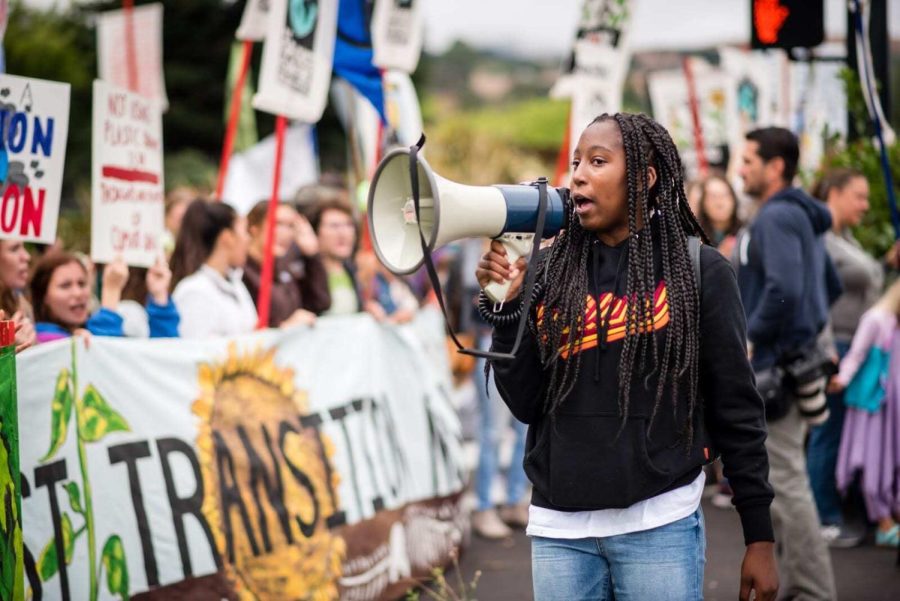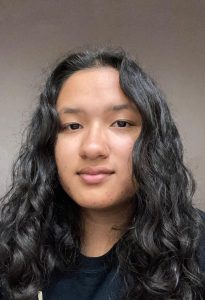Youth Activist Aniya Butler Receives 2022 Award in the Environmental Humanities
April 15, 2022
Aniya Butler, youth climate activist and poet from Oakland, CA, is the 2022 recipient of the Utah Award in the Environmental Humanities.
The award is given out annually by the Environmental Humanities Graduate Program at the University of Utah. Jeffrey McCarthy, director of the Environmental Humanities program, says the purpose of the award is to celebrate environmental leadership.
“We try to celebrate environmental leadership … people who use the tools of the humanities to solve environmental problems,” McCarthy said. “We really want to be in the lead celebrating folks that are making a difference.”
McCarthy says every year, a committee meets to discuss potential recipients who they recognize as climate justice leaders in the U.S. and globally. Eventually, they narrow down a list of finalists and arrive at a recipient.
Butler is the fourth ever recipient of the award, and at 15 years old, the youngest. McCarthy said choosing a young recipient was a conscious choice to recognize the contributions of youth in the climate justice movement.
“The thing to notice here is that the award has previously gone to people who are very established figures, and those people tend to be in their late 50s into their 60s,” McCarthy said. “We really wanted to celebrate youth activism … there’s a lot of leadership and important ideas coming from the youth.”
Butler has been writing poetry since she was eight years old and says it was the medium that first connected her to activism. She published a book of her poetry at the age of 12 titled “This World is Going to Change” and has since published other pieces through a writing center in Oakland called Chapter 510.
“[Poetry] literally was my activism before just learning all these different skills and organizing … I would not be where I am now without poetry at all,” Butler said. “I was a person who wanted to be really involved in activism, but I didn’t have the courage to do a speech … poetry was my way of advocating for my community and for what I thought was right.”
Before advocating for climate justice, Butler first became involved with activism through work in anti-racism. She said this foundation has influenced her intersectional lens on climate justice and her focus on environmental racism.
“I think me being an anti-racism activist has influenced my decision to be a climate justice activist because environmental racism is real and is one of the biggest aspects of the climate crisis in general, because specific groups of people will be facing more intense and more frequent experiences of the climate crisis than other communities who have more privilege,” Butler said.
Butler says she initially struggled to see her place within the climate justice movement, but this changed when she learned about this intersectional lens and the way climate change was having direct impacts on her community.
“It never really grasped me just because I used to think that I wasn’t impacted by climate change because I feel like the climate justice movement has been so whitewashed and presented as this thing that only impacts the polar bears and turtles … but there are like thousands of Black and brown people literally dying from poor air, dirty water and people having to leave their homes because of the effects of climate change,” Butler said.
The intersectionality of the climate justice movement is what draws Butler to be a climate activist, as she believes it is the key to solving so many other important issues.
“The climate crisis relates to so many different injustices that I’m fighting against … it’s really just a direct result of the foundations of oppression in white supremacy, colonialism, capitalism, sexism and really all of these horrible things that our country and really our world is founded on,” Butler said. “Climate justice … is about dismantling those systems completely and really rebuilding a world where every living thing is able to thrive … it’s a movement where you can literally fight for anything because if you’re fighting for climate justice you’re fighting for justice overall.”
One group that Butler has been heavily involved in as an organizer is Youth vs. Apocalypse, which she joined when she was 13. The organization is a Bay Area based group led by youth fighting for environmental justice.
“We’re trying to change the power dynamics overall about what being a frontline organizer looks like … because we recognize that the climate crisis is something that is disproportionately affecting Black and brown, low-income communities, so those people need to be the ones at the forefront,” Butler said. “We do that by always prioritizing youth, youth of color and youth from low-income communities.”
Some projects within the organization include campaigns and school-based programs, where members of the team introduce students to climate justice issues. One campaign the group is working on right now targets the California State Teachers’ Retirement System, which invests billions of dollars into the fossil fuel industry.
Butler has organized various different events for the group, including climate strikes and creative writing workshops for youth. She also coordinates the hip-hop and climate justice initiative and says these are ways the group hopes to change what it means to be an activist.
“We use hip-hop and different types of art … to make it more inclusive but also to sort of get rid of this thing of what it means to look like an organizer or an activist, and showing it can be done in different ways, and one of those ways is using art,” Butler said.
Butler says she was surprised when she discovered that she had won the award, especially after looking into its past recipients. She says it came at a time when she needed that boost to continue in her work.
“I was really, really surprised because I didn’t apply for the award and I didn’t know that it existed, and I wouldn’t think that a person, like I haven’t been doing this work for that long … it was just crazy to think it was me,” Butler said. “At the time I was really feeling drained and just feeling like ‘Oh my god, nothing is working, people continue to make worse decisions for our planet, for our people,’ so just getting that award and being recognized for the work that I do was really, really cool and gave me the boost that I needed to continue.”
Butler was given the award in person at an event that took place on Tuesday, March 22 at the Alumni House. Following an introduction of Butler and her speech, McCarthy said the event included a conversation between Butler and local youth activists.
“There’ll be students from local high schools … they’re going to kind of build momentum for youth leadership and build excitement around the importance of listening to those young voices and learning from them,” McCarthy said. “We want to take the opportunity to learn from Aniya and her perspective.”
McCarthy says it is important that activists are recognized for all of the labor that goes into their work, and especially to highlight those who are often forgotten within the environmental movement.
“There’s so much energy that gets put in … but it only briefly gets recognized,” McCarthy said. “It’s particularly important for us to listen for voices that have not always been heard in the environmental field, and so to include women of color … people who are working on anti-racism, broadcasting those voices offers a really important perspective on what environmentalism can be moving into the future.”
In terms of her future plans, Butler is not sure what exactly she wants, but she knows she enjoys all the work involved in her activism.
“I just really enjoy the work that I do now … being able to work with youth, specifically with creative writing, and I also just really like the organization stuff like grant writing and fundraising and stuff like that, so I think I just want to continue in that field,” Butler said.








